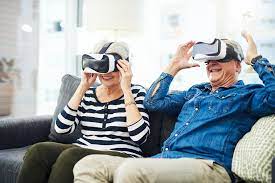Top Three Uses of Virtual Reality for Seniors
Top Three Uses of Virtual Reality for Seniors
Virtual reality (VR) has rapidly emerged as a transformative technology with the potential to revolutionize various sectors, including healthcare and entertainment. While VR is often associated with gaming and immersive experiences, its benefits extend far beyond these realms. In recent years, virtual reality has shown great promise in improving the lives of seniors, enabling them to engage in new experiences, enhance cognitive abilities, and promote overall well-being. In this article, we will delve into the top three uses of virtual reality for seniors, highlighting how this technology can positively impact their lives.
Enhancing Social Connections
One of the significant challenges that seniors often face is social isolation. Limited mobility, health issues, and distance from loved ones can contribute to feelings of loneliness and a decreased quality of life. Virtual reality can provide a powerful tool to combat social isolation and facilitate social connections for seniors.
Through VR, seniors can participate in virtual social communities and interact with others from the comfort of their homes. Platforms like VRChat and AltSpaceVR offer a range of virtual environments and activities, enabling seniors to attend virtual meetups, engage in group discussions, or even explore virtual travel destinations together. By transcending physical limitations, virtual reality fosters a sense of belonging, reduces loneliness, and promotes mental well-being among seniors.
Additionally, virtual reality can also bridge the gap between generations. Through VR, seniors can interact with their grandchildren or younger family members in virtual environments that can facilitate shared experiences, such as virtual games or immersive storytelling. This intergenerational connection can strengthen family bonds and provide seniors with a sense of purpose and joy.
Cognitive Stimulation and Rehabilitation
Aging often brings cognitive changes and challenges. However, virtual reality has shown promise in stimulating cognitive functions and assisting in rehabilitation for seniors dealing with cognitive decline or post-stroke recovery.
Virtual reality environments can be tailored to provide cognitive challenges, such as memory exercises, problem-solving tasks, and spatial awareness training. These activities engage the mind and can help improve memory, attention, and overall cognitive functioning. VR applications like MindVR and CogniFit offer personalized cognitive training programs designed specifically for seniors, adapting to their abilities and tracking progress over time.
In the field of rehabilitation, virtual reality has been successfully employed to aid seniors in regaining mobility and dexterity. VR-based rehabilitation programs offer engaging exercises that simulate real-life scenarios, such as reaching for objects or walking in virtual environments. These immersive experiences enhance motivation and adherence to therapy, leading to better outcomes in physical and occupational rehabilitation. Here is the Top Rated Meta Quest 2 Virtual Reality System.
Therapeutic Applications
Virtual reality has emerged as a valuable therapeutic tool for seniors, offering novel ways to manage chronic pain, reduce stress, and improve overall well-being. By immersing seniors in virtual environments, VR can distract them from physical discomfort and provide relief.
For seniors with chronic pain conditions, VR experiences can offer a welcome respite. Virtual reality can transport individuals to serene natural settings, tranquil gardens, or even calming underwater scenes. These immersive environments have the potential to reduce pain perception, decrease reliance on pain medication, and improve overall mood and well-being.
Moreover, virtual reality relaxation programs, such as guided meditations and mindfulness exercises, can help seniors manage stress and anxiety. By immersing themselves in soothing environments and engaging with interactive elements, seniors can achieve a state of relaxation and find solace in the virtual realm.
Conclusion
Virtual reality holds immense potential to enhance the lives of seniors in multiple ways. By addressing social isolation, stimulating cognitive functions, and providing therapeutic benefits, VR technology offers a means for seniors to lead more fulfilling and enjoyable lives. As this technology continues to advance, it is crucial to explore and expand its applications for the well-being of seniors, ensuring they can embrace the opportunities and benefits of virtual reality in their golden years. If you liked this article you may also like ChatGPT Extra Income For Seniors.




